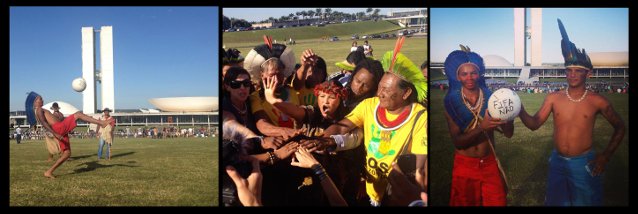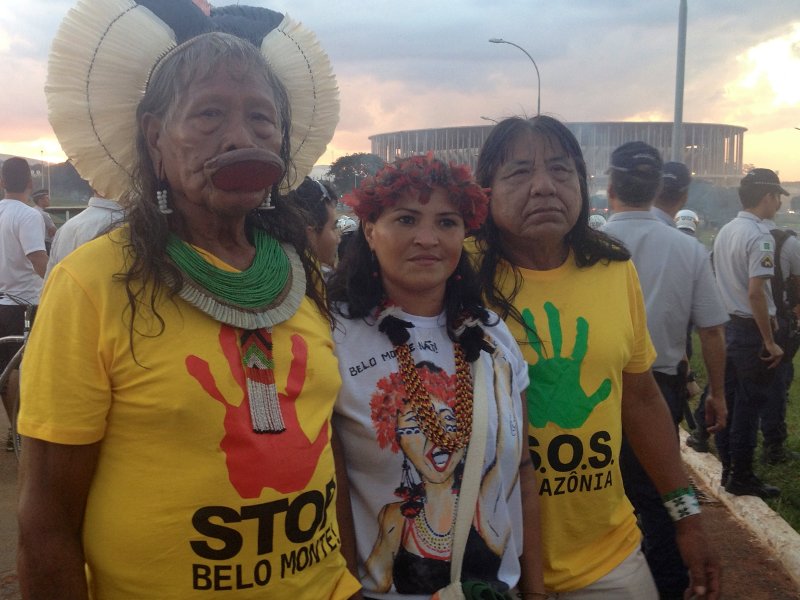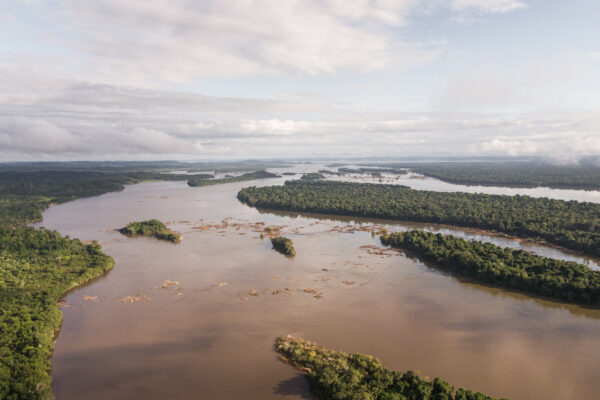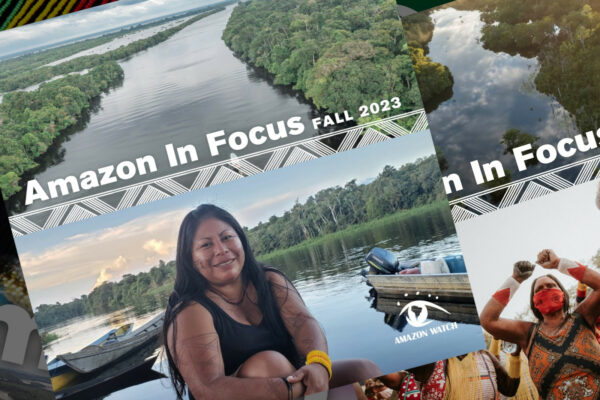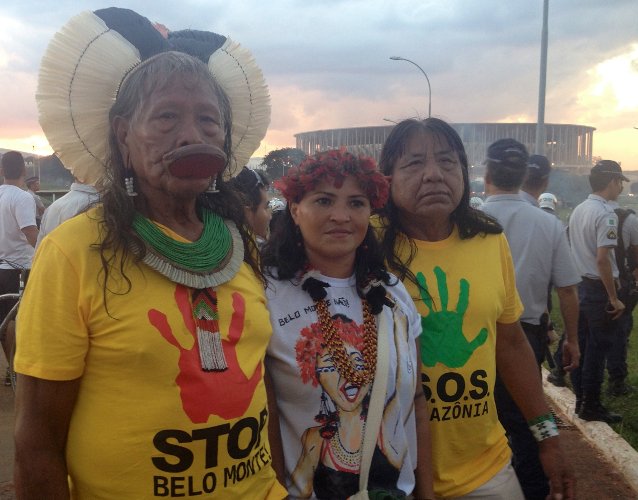
“I like football, and the children in our village play it well,” legendary Kayapó Chief Raoni told journalists in England as the World Cup neared in Brazil. “But we also have our own sport, hitting coconuts with our war clubs. If the canopy of the forest disappears, and the sun is hot, and strong winds blow – our lifestyle will also disappear.”
Raoni spoke to reporters in his native Kayapó tongue as Chief Megaron translated to Portuguese in a video, their message clear across language barriers: Stop destroying the Amazon and respect Indigenous rights!
Just two weeks ago, the pair was in Brasilia for Terra Livre, a national indigenous mobilization where 500 indigenous people from over 100 ethnicities across Brazil gathered to demand their rights to life and territory, which have been under wholesale attack by the government, namely by the agribusiness lobby in the National Congress. The group came to express concerns and present alternatives to a proposal to transfer power to demarcate lands from the executive to legislative branch of government (PEC 215). If passed, economic exploitation of indigenous territories is likely to increase, not only because lands wouldn’t be further demarcated, but also because Congress would have the power to rollback already demarcated lands. Currently, President Rousseff is sitting on stacks of proposals requesting demarcation of indigenous territory, but they are just paper stacks. Rousseff has only approved three requests this year when the average has been 13 in the past. Demarcation of Kapot-Nhinore, Chief Raoni’s homeland surrounded by soy and cattle ranches, is one such request pending approval.
Indigenous peoples across Brazil and across the Amazon are increasingly threatened by encroaching agribusiness, oil and gas projects and large infrastructure projects such as highways and dams. The Belo Monte dam, currently under construction in the heart of the Brazilian Amazon on the Xingu River, is one of those projects. According to Norte Energia, the government consortium building the dam, the project is 50% complete, but is mired in gross local, national and international environmental and human rights violations. Furthermore, Belo Monte is the first of a destructive series of dams slated for the Amazon, including 29 proposed dams on the Tapajós and Teles Pires rivers. Mega-dams in the Amazon are not clean energy – they are dirty and destructive for rainforests, for rivers and for rights.
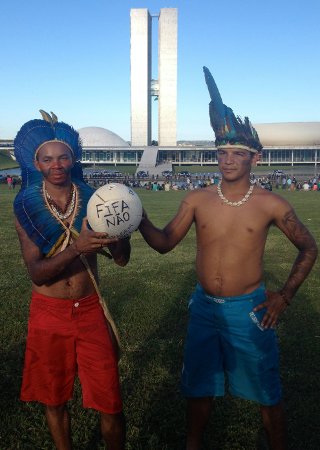
As the World Cup kicks off in Brazil, it’s time to get the ball rolling on truly clean and renewable energy in Brazil!
As the world’s eyes turn to Brazil this month, it’s important that calls for justice from indigenous peoples of the Amazon are not forgotten. At Terra Livre just weeks ago, indigenous leaders delivered declarations against attacks on their rights and territories to the Supreme Court and Congress. They then joined public workers protesting the World Cup. Signs read, “WORLD CUP FOR WHOM?” and “FIFA NO. DEMARCATION YES.” The peaceful demonstration was met by a violent response by the national police force. Chief Raoni and hundreds of men, women and children were tear gassed as they reached the newly remodeled national stadium in a foreshadowing of what may come to those who raise concerns near stadiums during the World Cup. “The World Cup will not be disrupted,” stated President Rousseff.
And she’s right! The World Cup will go on, and I’m sure it will be an amazingly entertaining show. The question is not whether or not the show will go on, but just how much it will cost and what those costs will mean for Brazil and its people. Endless news reports list the financial costs of the Cup. USA Today reports: The $14 billion total is the predicted spending on building and renovating 12 stadiums, upgrading federal, state and city infrastructure, plus security plans to welcome the 32 teams and around 600,000 expected visitors.
That’s right – Brazil spent $14 billion, FIFA pays no taxes and will make $4 billion in profits? Nearly 200,000 people have been displaced to make way for the World Cup, including indigenous people living in the old Indian museum adjacent to the Maracana stadium in Rio.
Brazilians love soccer and for the most part are ecstatic that their country is hosting the World Cup, but this does not come without valid concerns about the hefty price tag, an exorbitant investment at the expense of social needs and essential services such as education, healthcare and housing. They are also concerned about workers rights, indigenous rights and the environment. But the show will go on, and the same Brazilians will likely watch the games too, be it in fancy stadiums or in the streets. “We love futbol and we’re going to celebrate this moment,” a taxi driver told me during a recent visit to Brazil. “FIFA or the government cannot take that away from us. FIFA is the enemy who forced the remodeling of Maracana that eliminated thousands of seats.”
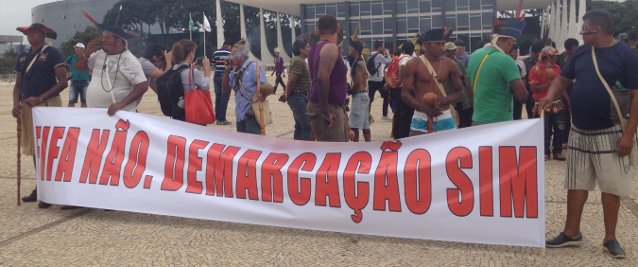
Go ahead – watch, go to, enjoy the World Cup! – but know that it comes with an enormous price-tag that should not be ignored. What can YOU do?
- Join us on Facebook and share photos from Terra Livre.
- Change your Facebook profile photo to this image created by our friends at Planete Amazone. They have launched a global campaign during the World Cup to STOP Belo Monte.
- Watch & share entertaining & informative videos!
- SOS Amazonia-Stop Belo Monte World Cup
- We’re Fed Up (Brazilian celebrities speak out for indigenous rights)
- #StoptheBall
- No, I’m not going to the World Cup
- Yes, you can still go to the World Cup – IF
- Share these hashtags on social media:
- #TAMUATEAKI and #WEREFEDUP!
- #FIFANAO #DEMARCACAOSIM
- #FIFANO #DEMARCATIONYES
- #SOSAMAZONIA #STOPBELOMONTE
- #ENERGIAPARAVIDA #ENERGYFORLIFE
- #RETHINKHEWORLDCUP
As the ball rolls on at the World Cup, we’ll do our best to keep you informed of calls and reports from our indigenous and NGO allies in Brazil. We hope that the world looks beyond the stereotypes of soccer, sex and samba during and after the matches to see that basic, social, cultural, environmental and economic needs of Brazil are not ignored.
“We should be finding a solution together to preserve the forest for the future of our children and our grandchildren and our great-grandchildren,” Chief Raoni reminded us. “What’s going to happen when it’s all gone, when it’s all destroyed and there’s nothing left?”
More info:
